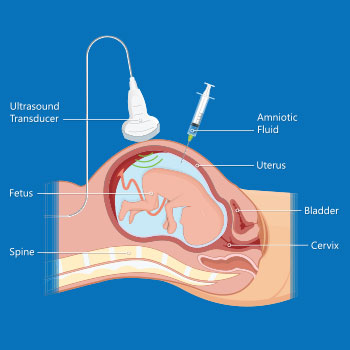
Amniocentesis
Amniocentesis
Amniocentesis (also referred to as an amniotic fluid test or, informally, an "amnio") is a medical procedure used primarily in prenatal diagnosis of chromosomal abnormalities and fetal infections as well as for sex determination. In this procedure, a small amount of amniotic fluid, which contains fetal tissues, is sampled from the amniotic sac surrounding a developing fetus. The fetal DNA is then examined for genetic abnormalities.
The most common reason to have an amniocentesis performed is to determine whether a fetus has certain genetic disorders or a chromosomal abnormality, such as Down syndrome. Amniocentesis (or another procedure, called chorionic villus sampling (CVS)) can diagnose these problems in the womb. These prenatal examinations can prove helpful to expectant guardians, as they allow for evaluating the fetal health status and the feasibility of treatment.
An amniocentesis is performed by a Fetal Medicine Specialist when a woman is between 15 and 20 weeks gestation. Women who choose to have this test are primarily those at increased risk for genetic and chromosomal problems, in part because the test is invasive and carries a small risk of miscarriage.
